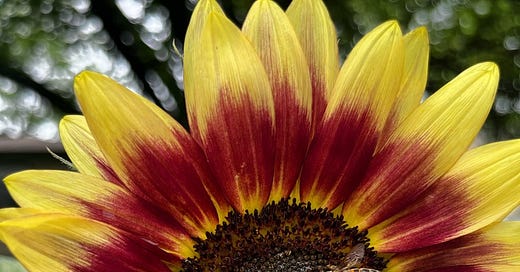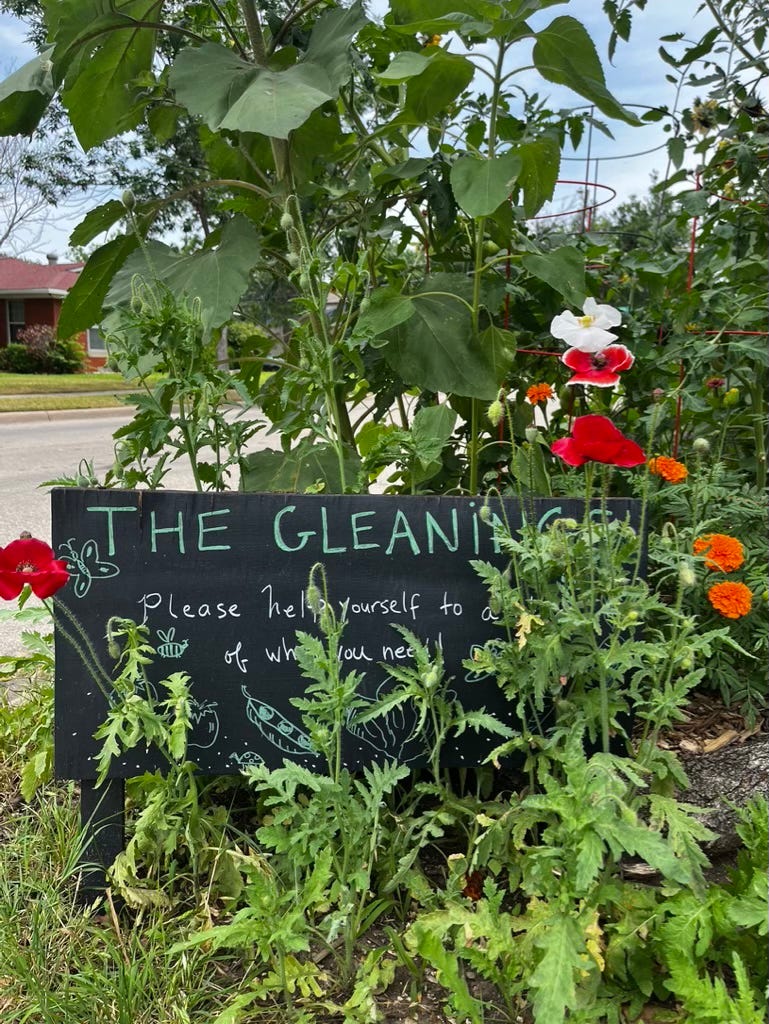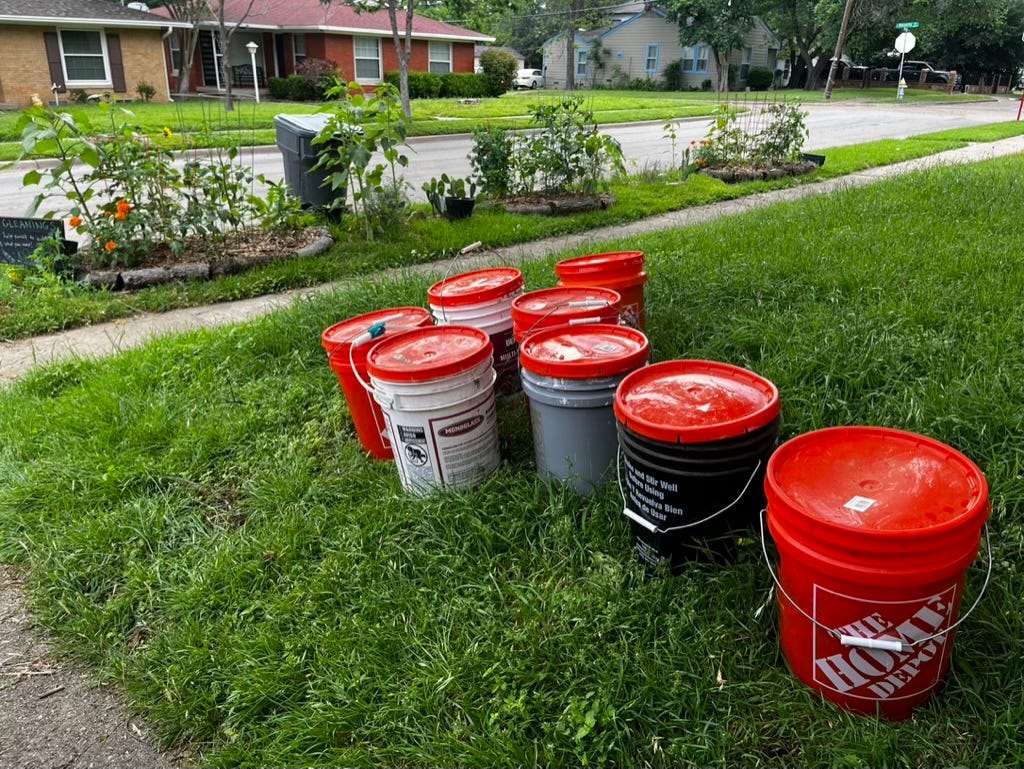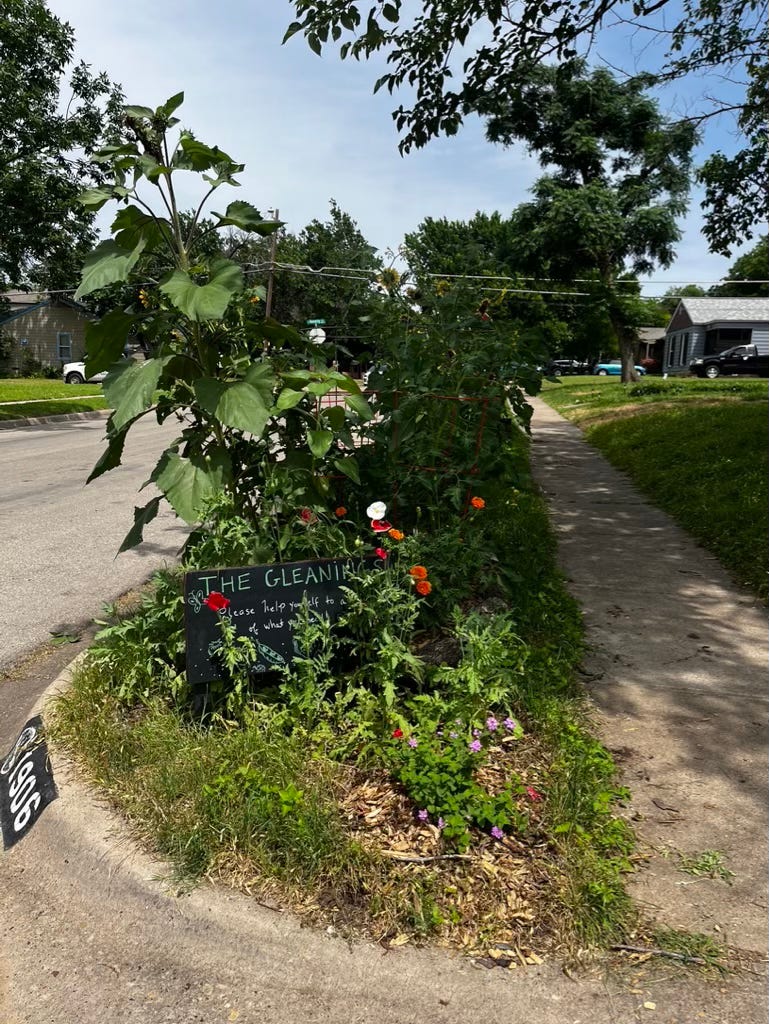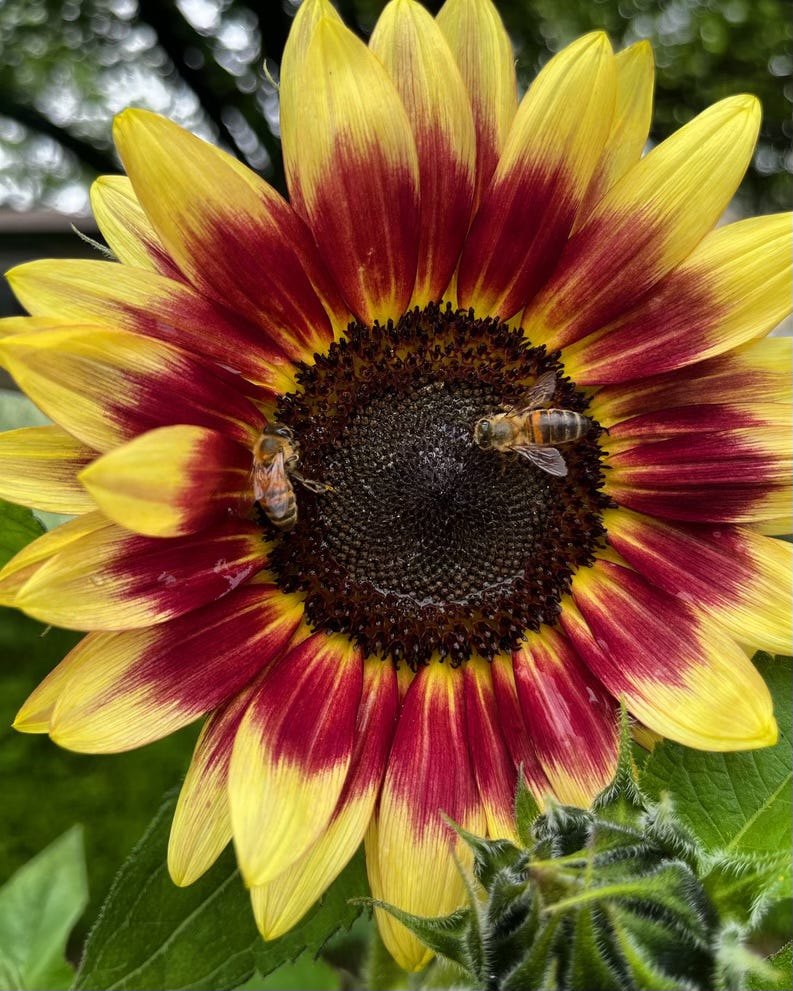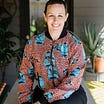Rose and I met through an essay she wrote called “Little Starts,” which I loved and filed away with all the other bits in my crowded brain of things to hold onto. When I started germinating seeds for FED in late winter, I pulled this bit to the surface as “perfect” and invited Rose to join us for our inaugural season. Unlike the rest of the crew, Rose and I have never met, nor even so much as talked on the phone. Instead, I made friends with her work and then, asked its author to share some with you.
Sometimes, this is the way. My best friend in California, when I lived there most recently, was a 350 year old Douglas fir, six feet from my front door in the Santa Cruz mountains. Since April Fool’s Day of 2021 my closest friend, though the relationship is complicated, has been the Rio Grande and its 2000 miles of watershed.
Friends need not be people to enrich our lives, and FED is predicated on this concept, that art can be our very best friend, as can a sunflower, and even a thoughtful easement with a generous invitation along a strip of curb. That friends of all sorts—human and otherwise—can bring us together, comfort us, create community with and for us, and nourish us fundamentally.
Rose is up to all sorts of nourishing inventions and interventions in Dallas, far from her home in Scotland, but home for now with her family. I hope you make friends with her work, as I did. And, if you find yourself in Dallas, and you see a planted easement, I hope that you glean to your hearts content, for all that you need.
Big love, Ashley
Easement, an Excerpt
At the front of our house in Texas, a thin sliver of land lies between the footpath and the road. Some people plant trees on theirs, but often they are bare, burned little strips of grass that must be mowed, or watered, and people do water them, at the height of the summer, sprinklers on at ten in the morning when it is already one hundred degrees out.
In the early spring, my mother comes to visit from London.
“What’s that for?” She asks, pointing one muddied finger at the strip which I have since found out is called an ‘easement’. She’s been raking and bagging leaves all day, worried that snakes will gather under Gilly’s window where most of the fallen leaves blow.
I shrug and haul another bag of leaves to the garage for later on in the year when I will scoop handfuls of them into the compost as a complement to the buckets of rotten vegetables I collect from the women I have gathered into an ad-hoc personal compost club.
My mother and I work but don’t talk. Or, we talk, but lightly. I hold myself close, careful not to be too much, though I always fail at this. It’s a skill I have been learning all my life, along with how to mulch, and compost, and weed, taking care of plants with a tenderness that sometimes didn’t abound in our house.
Later that week, she and I decide to plant the easement. I have a pile of long logs in the yard that I collected from other people’s easements to save them from the landfill and have been keeping for a rainy day. We pull them to the curb and begin to build an oval-shaped raised bed from the wood. I lay down three layers of cardboard to kill the grass, then we pour in bags of soil, some expanded shale, and then empty one of my compost bins of its well-rotted compost and add that in. My mother and I use hand-forks and a trowel to loosen and stir the mixture, adding a little of this and a bit of that until we have the right consistency: light and fluffy, damp and rich, a golden black that smells sweet like the earth.
As a young child, older than my son is now, but young enough that I wasn’t at school yet, my mother would take me to her herb garden while she worked. The herb garden was part of my parents’ farm which consisted of a vineyard, a winery, a farm shop, and fields of livestock that swept away from the house that sat at the centre of the farm. People came to visit the herb garden, to look around, but also to buy plants from the nursery. In the spring, my sister and I picked daffodils and sold them in bundles at the farm gate for pocket money. In the summer, I helped my mother in the nursery and garden, repotting plants and watering the rows and rows of pots, either outside in the bright sunshine, or inside the plastic polytunnel where she overwintered tender cuttings and seedlings.
The polytunnel had the same smell of sweet damp earth, the humidity trapped by the clear polythene ceiling. It was bright in there, and quiet. My mother could grow anything—she still can—and this place, where she unloaded her compost, dipped her cuttings into rooting powder before embedding them in soil and adding them to the long line of potted plants—this place was hers. It was safe. It was quiet, and there were plants. That’s what I have needed in my life to feel that everything can be survived.
In Dallas that spring, my mother and I plant tomatoes from seedlings I started under a light in my office, and some Mammoth sunflowers. “Wouldn’t it be cool if people came by and picked flowers and vegetables from here?” I say to my wife Nomi later on, but the idea is already taking off in my brain and I’m not slowing down enough to listen to her answer, the thoughts speeding through my cells, filling me with pinpricks at the excitement and largeness of it. I’m already asking myself if I have enough compost and logs to make it happen, how I might go about making signs so that people know they can help themselves, and whether it’s too late in the season to get plants established before the hellish heat of summer. It doesn’t occur to me to ask if the city allows gardening on the easement; much later I Google it and find out they do not. Now the garden feels like a radical act of resistance.
“That would be lovely, darling,” she says, as she always does to the ideas that I spring from nowhere, and from seed I plant cosmos––papery pink heads––and sunflowers that bloom blood red and gold. I add two aubergine plants, and a shishito pepper that I dug up from a friend’s garden because she was going to be gone all summer. I transplant the coneflower plants from a bed at the back; I sow kale seeds, and marigolds. It’s too late for peas, but not cucumbers, whose seeds I nestle into mounds of warm soil, my bare fingers grasping at the dirt. One morning, my son and I take some radish seeds, dip our fingers into the soil every three inches, and slip two seeds in each hole.
Instead of writing, I spend my mornings shovelling compost from the bins behind the garage, digging it from its rotting heap and layering it on top of the beds and around the plants, a strange thrill rasping through me knowing that everything we have wasted as a family is going to feed this bright blooming bed. With my hands I take clumps of compost, smelling of citrus and wood-fire ash, and crumble them loosely on the soil. I sprinkle eggshell shards around the stems of plants to stop the slugs from getting them, and I remove anything that I’m sure is a weed. From the timber offcuts I saved from other peoples’ easements, I bang together rough signs and paint them deep blue. Nomi adorns them with whimsical pictures of butterflies and bees and a text that reads:
THE GLEANINGS: Please help yourself to a little of what you need
Gilly and I start a ritual. Each morning before school, he and I go hand in hand to the bed to see what’s new. The aubergine plant has bloomed a lilac flower; there are a hundred tiny shishito peppers fattening like fingers under the sun. The sunflowers, they grow nine feet tall and on this day, a caterpillar inches its way, humping its back then flattening itself forward, up the stem; a ladybird lands, quivering its wings. The cosmos and zinnia lean across the pavement, scattering their petals on the concrete.
“Be careful that people don’t steal things,” a neighbour stops by to tell me one day when we’re out there together. She holds a stick in her hand to fight off loose dogs. “People are bad, you know?”
“That’s what I hope,” I say brightly, remembering my friend Sim who used to grow cherry tomatoes in an old bathtub in front of his flat in London. I would watch as kids on their way to school stopped to ask him what he was doing, confused because they had never seen a tomato grow before. And how he would pick a tomato and unfurl it in his big hand, then split it open to show them the seeds inside. And how they would each pick one to eat, popping it into their mouths and marvelling at the sharp sweetness. My dream is to look out of the window at the easement one day and see a group of kids pilfering tomatoes and peppers into their pockets and one dull day in June we do, a dad and his daughter stop to pick a cosmos flower. She holds it in her tiny fingers and looks up at her father, smiling at the fortune of it all.
Dive in for more goodness…
To learn more about Rose and FED’s entire Spring 2024 all-star line-up of musicians, artists, writers, growers, gleaners, cooks, and craftspeople, check out Special Guests.
Who’s washing dishes?
If you are enjoying your place at the FED table—made possible because readers, contributors, and editorial all pitch in to make it happen—we encourage you to pitch in, too, by upgrading your free subscription to a paid subscription.
When you click the upgrade button below, you can set your subscription rate based on your values, priorities, and means. Funds are then redistributed throughout the community to support contributors, editorial, production, and equitable access. For more information about our connection-economy, check out About FED.
Together, we co-create sustainable connection, inclusive placemaking, and global community. Thank you!
FED is a participant-created and supported publication and community. We encourage you to pass it on. All are welcome at the table!


